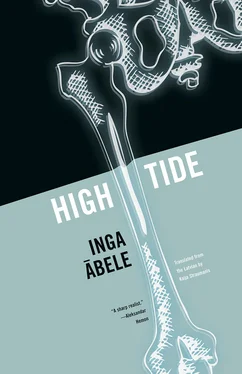Ieva had looked at him with such fear, the bluish whites of her eyes glazed over in the moonlight. He could tell by her breathing that what he had said was slowly sinking in.
“You shot him only because you’d learned how to kill in Afghanistan?”
But of course! The shotgun had been right there, loaded, and what’s more — Ieva had handed the gun to him herself. But of course, love! When would he have had another opportunity to get rid of the little bastard who’d ruined his entire life?
But he didn’t say that —because that thought was as wispy as a rose-colored, papery autumn sky — that he had possibly caught himself in his own lies. Now he was saying one thing, but at other times, like when he was sitting in the dust of the prison yard, watching the wind tug at the leaves of the elm trees, and Ieva was so far away at the other end of the world past the barbed wire fences and one hundred twenty-four kilometers of forest, rivers and bogs, or when they made love, he was able to break free of himself, from the biting harness, he felt her contented breathing, and at those moments Andrejs could do the unthinkable — let all the happiness of the world flow into Ieva, because she herself was valuable, because she was worth it. And if she loved that son of a bitch Aksels, then at those moments — even though it was unthinkable — he was able to let himself imagine that she was even allowed to love Aksels. Even Aksels! And at those moments some kind of serpent, vibrant as a Latgalian wool mitten, would hiss into Andrejs’s ear that this was the kind of true love written about in the Bible. A love that didn’t hate, wasn’t jealous, didn’t destroy, wasn’t submissive, just carried you toward the sun — carried, carried, carried you, forever carried you.
But that wasn’t something Ieva needed to know.
He only added that he was the only one who could call her a bitch and, forgive him, but if he hears someone else call her a bitch, he’ll slit their throat.
“You’ve made me your personal swamp,” she said calmly after a pause.
Maybe it was then that she had already made up her mind.
Then they probably both finally fell asleep.
In the morning it was overcast, and the air was full of the bewitching scent of spring buds, but Ieva was unnaturally pale and silent. Even that usually beautiful final hour they had, during which they normally dressed, cleaned up, and wallowed in thoughts of parting, memories and glances — now it was hard as stone. And the guards had forgotten about them.
Once they’d dressed they sat stiffly on the beds facing each other, looking like they had met for the first time in their lives. The time came for them to go their separate ways, but the guards didn’t come. The black tentacle of the clock slowly slid to four minutes past ten, then to ten minutes past ten.
The room grew darker and darker, until finally the black-blue cloud outside broke open with a mighty crack, struck the earth with a blinding thorn, and unleashed a grey downpour. Rain beat against the windows with such force that it rattled the windowsill like a tin drum. Andrejs sprang to his feet and started pacing back and forth across the room, then suddenly took off his jacket and unbuttoned his shirt. It was a violet-colored shirt with dark stripes, possibly the nicest piece of clothing he had ever owned. And he put it around Ieva’s shoulders.
“Take my shirt,” he said, “you’ll get soaked.”
“That’d be just perfect — to forget about us in prison,” she said, letting out a fake laugh and glancing at the clock.
Five more minutes passed. Andrejs thought he was losing his mind.
“Just think, my shirt’ll be free in a few minutes,” he said, just to say something. Just to fill the eerie silence.
The sound of the rain droned on forever, then was suddenly extinguished like a candle that had been knocked over — the guards came in and Ieva and Andrejs both jumped up.
Andrejs obediently put his hands behind his back; there was the click of the cuffs, the jangle of keys, Andrejs at the door, her profile outlined by the flash of lightning, and then she was by him, close, close, a kiss, more like a bite in its desperation, warmth, her scent, the guard prying her fingers from Andrejs’s shoulders: “Your time’s up, ma’am!” Andrejs goes, turns a few corners down the hall, he knows which doors have glass windows, Ieva waves, hurries behind them, the fluttering of shirtsleeves and the hem of her white dress, she waves, her face, then another corner, then emptiness, the zone, and the storm.
The prison yard and silence, then it’s over.
Your time’s up.
And yes, after that at the next visitation time he waited for her in vain. All he got was her note: “Everything’s over for real now. Ieva.” And the shirt.
The hastily folded material still held her smell and the softness of her breasts. She had been here! She left a duffel bag with the shirt and the note. Stood in line some fifty meters away, shit, nothing between them but walls and guards — but he’d sensed nothing! His senses were deadened, she’d been here, but he hadn’t grown anxious, hadn’t moved, hadn’t felt anything — like an old camel, like a rundown Arabian horse whose nose can no longer sniff out water.
He hadn’t even dreamt of her.
Oh misery, godforsaken!
He hadn’t been prepared for the worst — for Ieva to leave him halfway, alone in prison. In the end it was betrayal; they were both up to their necks in the same shit. And then this!
She knew him too goddamn well, that was a fact. He’d carry his sentence until the end. But how could love so quickly turn into searing hate?
“Everything’s over for real now. Ieva.”
And the shirt.
But in living with Ieva, you had to be prepared for something like that. Naturally.
He wasn’t ready. He’d spent four years of his remaining sentence planning revenge.
Prison had become his home. And what’s to keep him from coming back home if he’s got a good reason? He had decided to erase Ieva from the face of the earth.
And then there was that unforgettable fall day — icy moisture dusted the skies, mud splashed up over his shoes and the frost bit through to the bone — the day Andrejs had wound up at the furnace.
Bound stacks of paper were brought to feed the zone’s boiler-room furnace. Leftover magazine issues, failed books, educational materials. And on that day, a blue, cloth-bound book of Ancient Greek myths for high school courses was lying among the frozen clumps of sawdust. Almost without reason, but mainly driven by curiosity and laziness, Andrejs smoked a cigarette and read a page in the book, then found himself unable to put it down.
There! He dug his unshaved chin into the collar of his down jacket. If only Ieva would come see him again, he’d read this book to her — there was no clearer way to say it. What Andrejs’s people referred to as love was complete bullshit. Talking nonsense by candlelight.
The Ancient Greeks knew that the gods were immortal, and told immortal tales. Once he’s placed in time, a mortal isn’t able to think of an immortal tale, much less tell one. A person’s existence winds around birth and death like a ribbon around two magic wands. He was curious to see how they’d solve the issue of immortality — if a story has a beginning, but no middle or end, what kind of skeleton is the meat of the story holding on to? If a god isn’t moved by his own death to act, then what does that god think about? It turns out — the gods think of nothing but power. The principle of power classifies existence under immortality.
Andrejs took the book. He tucked it under his shirt instead of throwing it into the furnace. And at night, he read about Odysseus by flashlight:
Читать дальше












